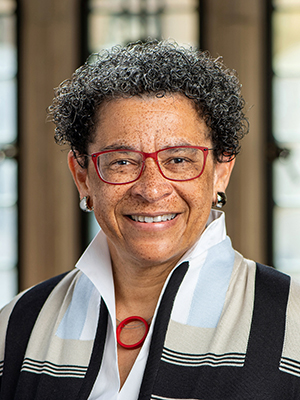Jacqueline Goldsby
Ph.D., Yale University, 1998
A.B., University of California at Berkeley, 1984
My research and teaching focus on African American and American literature. I’m especially interested in the ways that authors and texts articulate un-archived, “secret” and so, unspeakable developments that shaped American life during the long century of Jim Crow segregation’s reign, from 1865 to 1965. I explore these tensions through interdisciplinary approaches to formal close reading, together with the material and cultural histories of Black-authored books—their composition, publication, circulation, and reception.
For instance, my first book, A Spectacular Secret: Lynching in American Life and Literature (2006), examines how literary depictions of anti-Black mob murders at the turn of the 20th century figure the violence as a trope of American modernity. Following from A Spectacular Secret, I prepared a Norton Critical Edition of James Weldon Johnson’s 1912 novel, The Autobiography of an Ex-Colored Man. That project reclaims Johnson’s novel as an important hinge linking African American modernism to Anglo-American modernism. As important, my research recovers the publishing history of Johnson’s novel, tracing its reprintings as a case study of the racial politics underpinning US publishing history’s developments in the first half of the twentieth century.
My next monograph, Writing from the Lower Frequencies: African American Literature at Mid-Century, focuses on the regenerative aesthetic life that Jim Crow segregation gave rise to during the mid-20th century. How to explain the aesthetic cosmopolitanism of African American literature’s “lost generation”–those fabulous, brilliant writers of the post-World War II/pre-Civil Rights Movement era? What literary ecologies made those authors’ emergence and impact as a cohort both decisive and hard to classify? I want to think these questions through in relation to Pierre Bourdieu-informed “field theory” of Black literary production during those decades.
To research Writing from the Lower Frequencies, I’ve had to recover the archives I want to write about. Two of these initiatives have received major funding from the Andrew W. Mellon Foundation.
The first, “Mapping the Stacks” (2005-10), recovered manuscripts, sound recordings, photographs, and moving images that document Black Chicago’s literary, cultural, and visual histories during the 1930s-1970s. Mapping the Stacks played a key role shaping the recent rise of “Black Chicago Renaissance” studies. The second initiative stems from my research in African American Book History. I co-direct “The Black Bibliography Project” with Meredith McGill of Rutgers University. We launched the BBP in 2017. Our goal: to revive descriptive bibliography—the systematic description of print materials as physical objects—for African American and Black Diaspora literary studies. We’re creating a digital database whose capacities can reveal the dynamic social formations and aesthetic practices that are specific to Black print culture in the U.S. and beyond.
I joined Yale’s faculty in 2011. I served two terms as Chair of Yale’s African American Studies Department, 2014-2022.
Teaching Interests
20th century African American and American literature; African American and American history of the book, publishing, and authorship; critical bibliography studies; textual studies and criticism; Afro-Modernisms; Black Chicago Renaissance Studies
Selected Publications
“Black Bibliography: Traditions and Futures,” Special Issue co-edited with Meredith L. McGill, Papers of the Bibliographic Society of America 116:2 (June 2022).
“ ‘Something is Said in the Silences:’ Gwendolyn Brooks’ Years at Harper’s,” American Literary History 33:2 (Summer 2021): 244-270.
“Book Faces,” in The Unfinished Book, eds. Deidre Lynch & Alexandra Gillespie (Oxford UP, 2020).
The Autobiography of An Ex-Colored Man. James Weldon Johnson. Ed., Jacqueline Goldsby. (W.W. Norton, 2015).
” ‘Closer to Something Unnameable’: James Baldwin’s Art of the Novel,” in The Cambridge Companion to James Baldwin, ed. Michele Elam (Cambridge UP, 2015).
A Spectacular Secret: Lynching in American Life and Literature (University of Chicago Press, 2006)
- Winner, William S. Scarborough Prize, Modern Language Association (2007)
- Finalist, Lora Romero First Book Prize, American Studies Association (2007)
Courses
Undergraduate: Readings in American Literature; Black Women Writers of the 1940s & 1950s; Introduction to African American Literature II (1900-1970); Black Pulp Fiction
Graduate: James Baldwin & the Politics of Formlessness; Black Literature & U.S. Liberalism; Mid-20th-Century African American Literature


